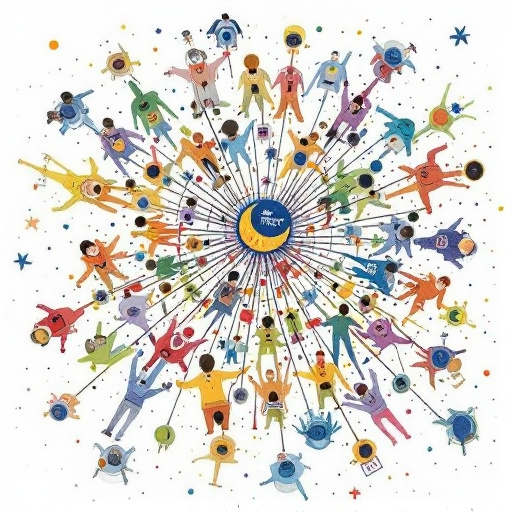Featured Articles
- Alumni as Unseen Influencers: How Grad Networks Shape Social Movements and Cultural Trends Today
- "Behind the Curtain: How College Alumni Networks are Fueling the Rise of Gig Economy Side Hustles"
- "From Campus to Cosmos: How College Alumni are Shaping Space Exploration and Tech Innovation"
- From Cap and Gown to Crypto: How College Alumni Are Shaping the Future of Digital Currency
- "From Classmates to Competitors: The Surprising Rivalries Among College Alumni and Their Impact on Careers"
"From Classmates to Competitors: The Surprising Rivalries Among College Alumni and Their Impact on Careers"
"From Classmates to Competitors: The Surprising Rivalries Among College Alumni and Their Impact on Careers"
The transition from college classmates to career competitors can evoke unexpected rivalries among alumni, fundamentally influencing their professional trajectories. This article delves into these rivalries, shedding light on their origins, impacts, and how to navigate this dynamic landscape effectively.
The Seeds of Rivalry: A Common Ground
During college, students often bond over late-night study sessions, group projects, and shared experiences. Yet, once they step into the professional realm, these connections can morph into fierce rivalries that shape careers in surprising ways. According to a study by the American Psychological Association, competitive environments in academic settings foster individuals' drive for success—but this drive can turn antagonistic once jobs are on the line.
The Competitive Edge: Fuel for Success
Imagine this scenario: two friends, Sarah and John, both graduates of the same prestigious university, land jobs at competing firms. Initially, they're thrilled for one another, sharing tips on navigating the corporate maze. However, as they climb the ladder, the friendly banter turns into a battle for recognition and promotions. It's an age-old tale of competition that can spur innovation but also fray relationships.
Statistics That Speak
Research by LinkedIn indicates that over 70% of professionals believe their college network plays a crucial role in career advancement. In competitive fields such as finance and technology, the stakes are higher, and the pressure to excel can lead to personal rivalries, causing relationships to sour. As former classmates become competitors, the friendly advice can quickly turn into strategic maneuvering for an edge over one another.
Case Study: The Harvard Effect
Take Harvard University, for instance, often referred to as a breeding ground for future leaders, entrepreneurs, and innovators. Alumni from this prestigious school frequently find themselves in direct competition. A report from Forbes highlighted that many successful startup founders were once classmates who now vie for the same investor attention. For instance, founders of well-known tech companies like Facebook and Snapchat have roots in the same college group, leading to comparisons and competition that can either drive them further or create a rift.
The Emotional Toll of Rivalry
Coping with the emotional hit of having a former friend turned competitor can take its toll. A Forbes article states that approximately 40% of professionals feel they experience stress due to competition with former classmates. It's not uncommon for alumni to feel pressure, leading to anxiety that can impact performance. If left unchecked, this rivalry can sabotage collaboration—key in an increasingly interconnected global economy.
Strategies to Navigate the Competitive Landscape
But there’s hope! Navigating the treacherous waters of alumni rivalries can be tackled with some strategic thinking. Here are five tips:
- Embrace Collaboration: Recognize the value of collaboration. Alumni can create partnerships that allow them to thrive together instead of competing against each other.
- Focus on Personal Growth: Shift the attention from comparing yourself to others to measuring your progress against your own goals.
- Maintain Strong Relationships: Keep lines of communication open with former classmates; support each other’s endeavors rather than resenting them.
- Celebrate Success: Take pride in the achievements of your classmates, realizing that their success does not diminish your own.
- Seek Mentorship: Look to mentors who can help you stay grounded in your career. They can provide perspective and guide you through competitive environments.
Class Reunions: A Double-Edged Sword
Class reunions can exemplify the tensions and friendships born from these rivalries. Attendees often compare career advancements, leading to a cocktail of envy and nostalgia. However, these gatherings can also offer closure and an opportunity for reconciliation. A humorous observation is that many bring an unexpected competitive spirit to these events, sharing not just updates on their careers but subtly hinting at their achievements—like discussing home values like they're scores on a scoreboard.
The Light at the End of the Tunnel
Not all rivalries lead to strife. Some individuals harness competitive energy positively, using it to push boundaries and create groundbreaking work. In the context of technology, this can be observed in former classmates launching successful startups to tackle similar issues in innovative ways. The rivalry creates a kind of sibling dynamic in business—a win for one might spark an innovative idea from another.
A Blend of Humor and Reality
As a 26-year-old alumni myself, I've seen this rivalry first-hand. Picture this: a gathering of college friends at a coffee shop. "I hear you're at that big corporation now," my classmate remarked, raising an eyebrow with faux-innocence. I responded with playful sarcasm, "Yes, just trying to keep up with your impressive Instagram followers!" That’s how rivals can be spun into friendships if humor and mutual respect prevail.
Global Perspectives: Rivalries Across Cultures
Diving deeper into the global landscape, we see that different cultures interpret competition amongst peers uniquely. In collectivist societies, such as in Japan, individuals may downplay their achievements to protect group harmony. In contrast, the U.S. culture often values individual success, leading to a more pronounced sense of rivalry. Understanding these cultural nuances can provide insights into managing competition and potential conflict.
Long-Term Impacts of Rivalries
While the thrill of competition can galvanize some, it’s crucial to recognize the long-term ramifications. A study published in the Journal of Business Research found that those who engage in persistent rivalries may experience burnout or disillusionment, leading to job dissatisfaction. Hence, alumni must bolster their resilience and commitment to their career paths, regardless of who’s making a splash beside them.
Going Beyond Competing
What if we were to flip the narrative? Instead of viewing classmates as these perpetual competitors, we could regard them as sources of inspiration. How many successful collaborations, partnerships, or even lifelong friendships have emerged from alumni networks? In many cases, rivals can become allies—empowering each other to break ceiling after ceiling in their respective careers.
The Silver Lining: Networking
In an era where networking reigns supreme, nurturing connections can significantly outweigh the negative aspects of rivalry. Becoming a member of alumni associations can transform competition into collaboration. Networking events facilitate sharing success stories and diverse insights that might pave the way for future opportunities.
Final Thoughts
In conclusion, the rivalry among college alumni can go two ways: it can become a source of motivation or engender bitterness. Acknowledging that this transitional landscape is filled with potential can help alumni navigate their paths more wisely. Embracing the community's spirit while respecting individual journeys will benefit everyone in establishing connections that foster growth. Ultimately, it’s about reshaping these rivalries into relationships that propel both individuals toward success.




